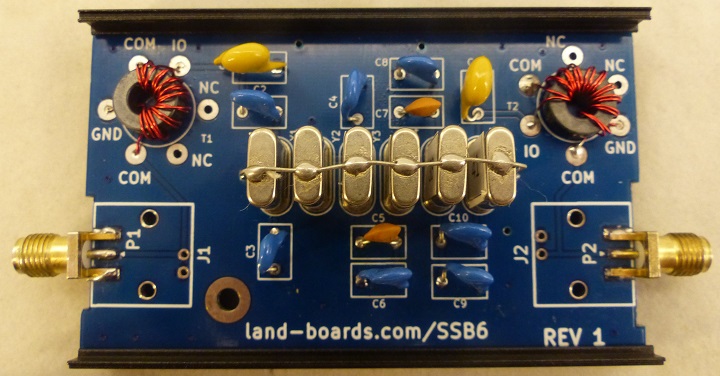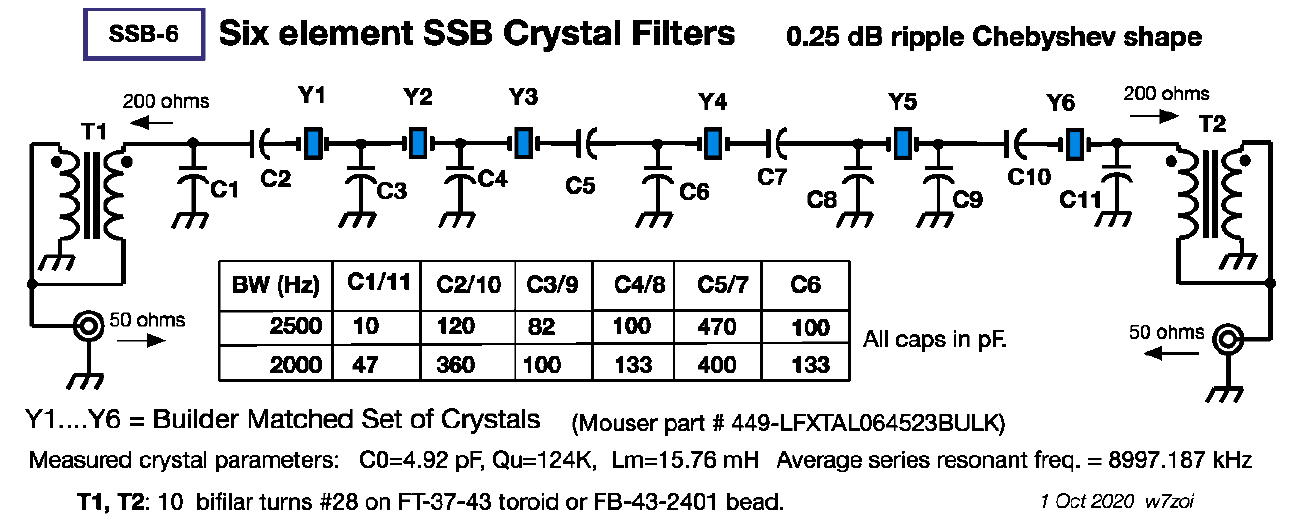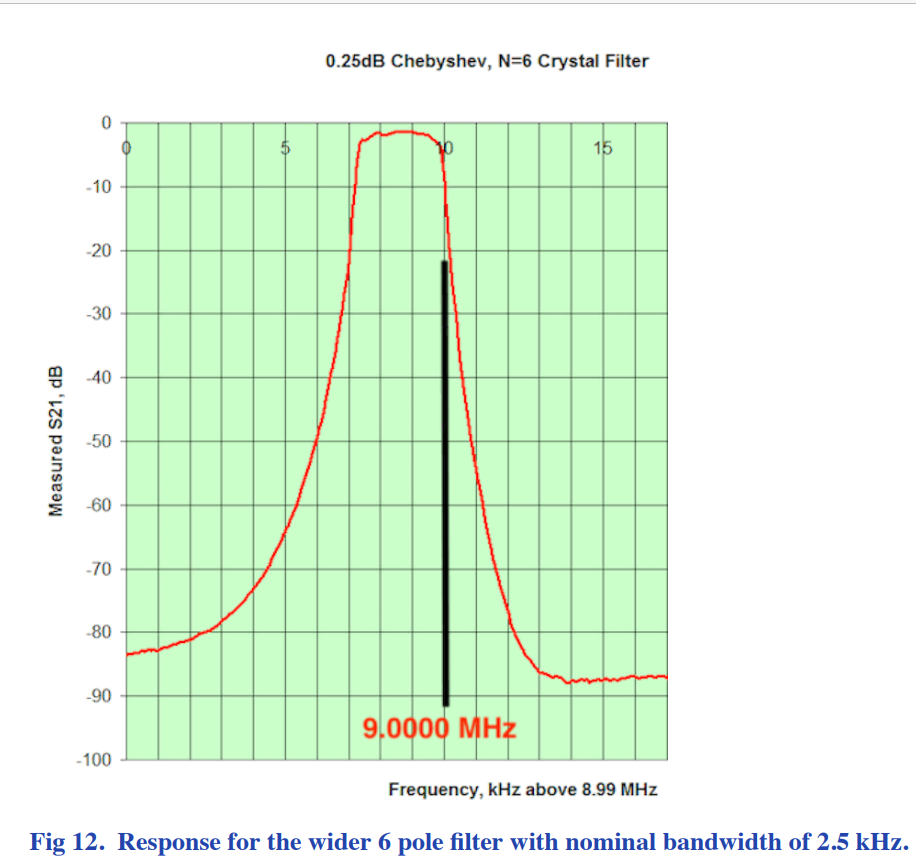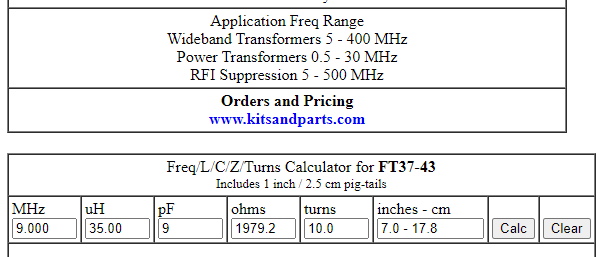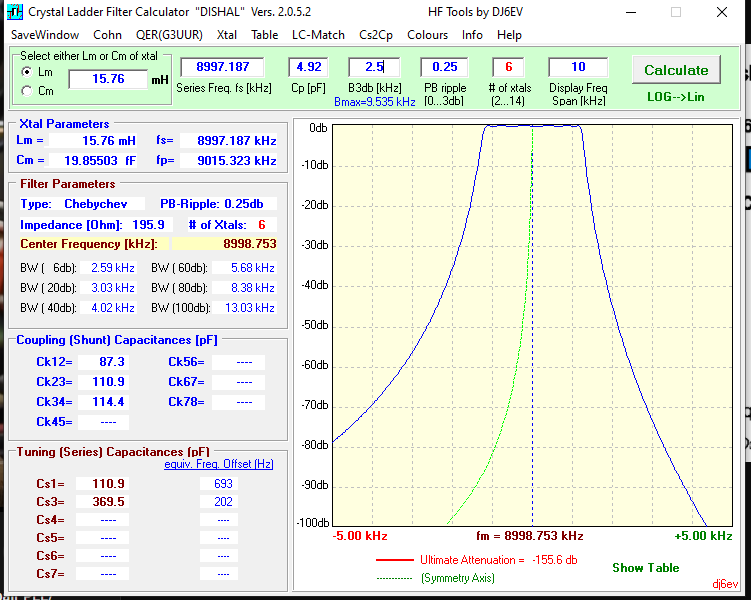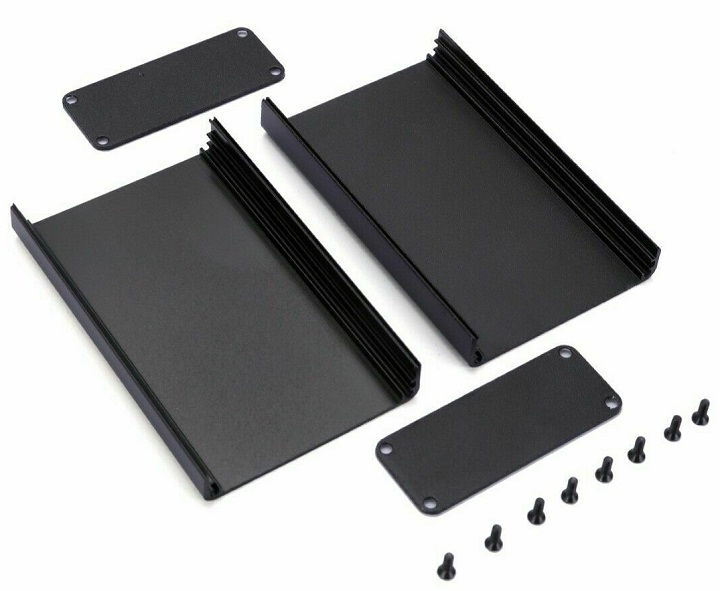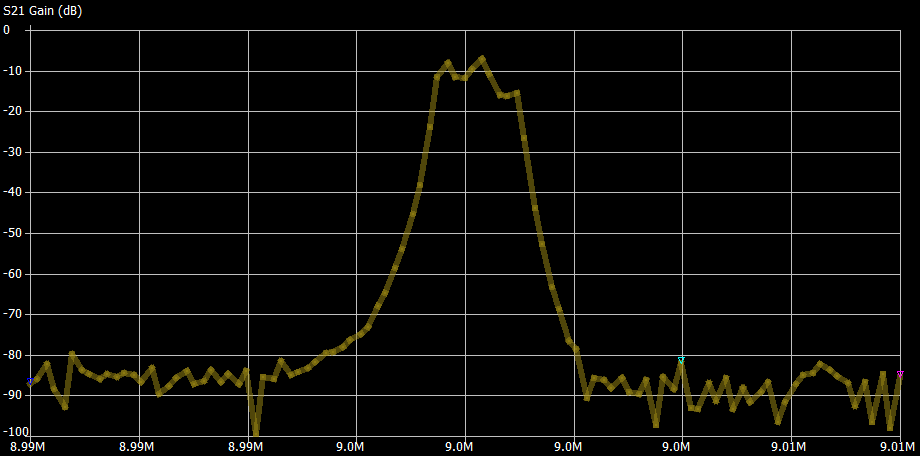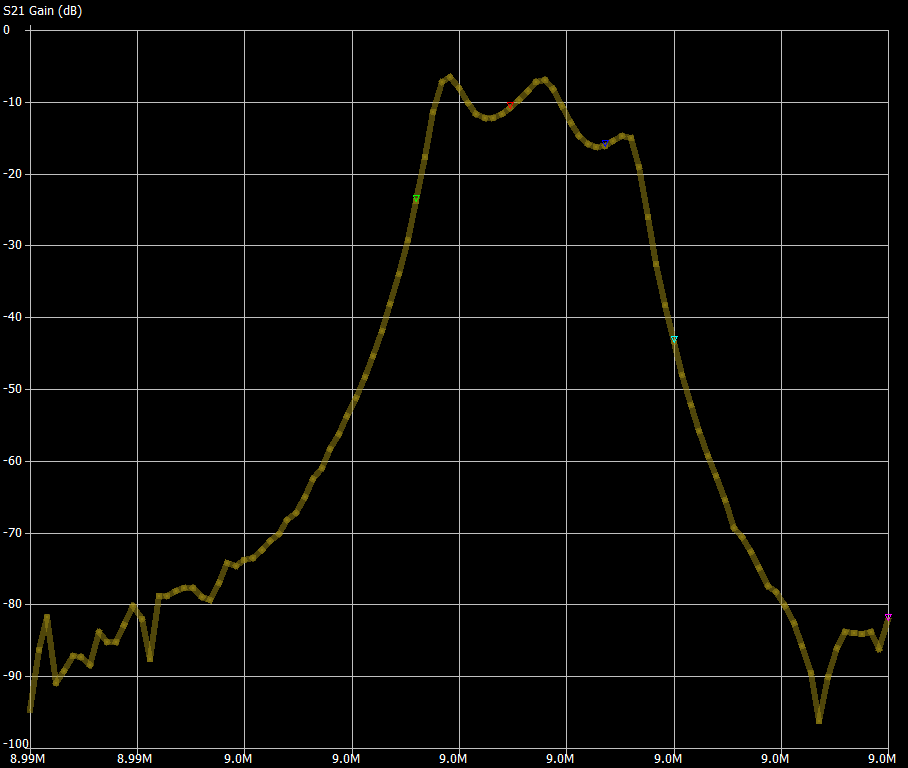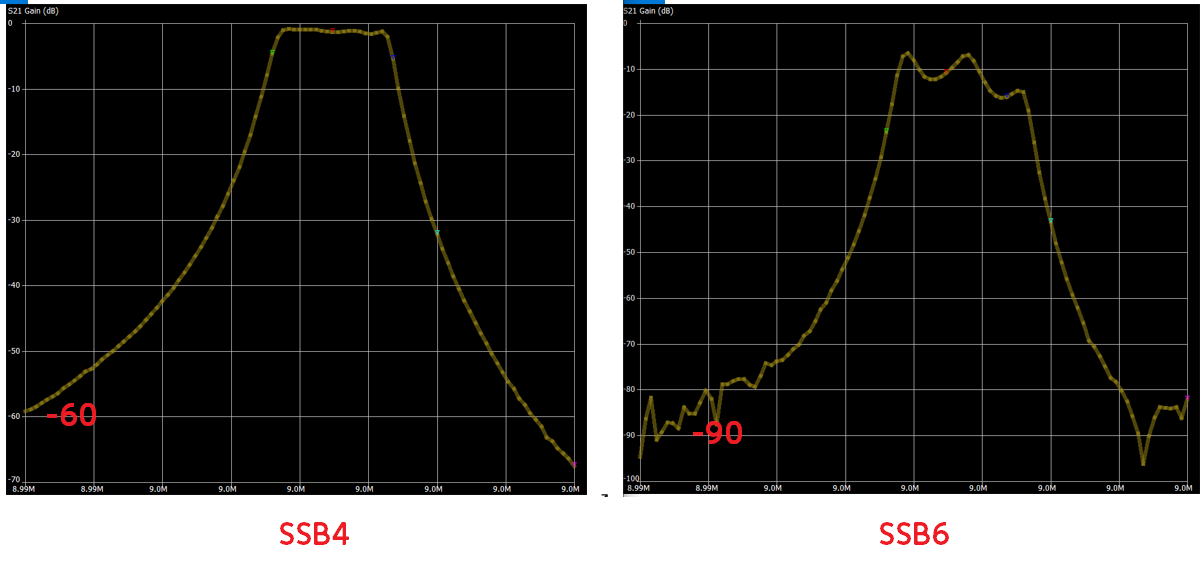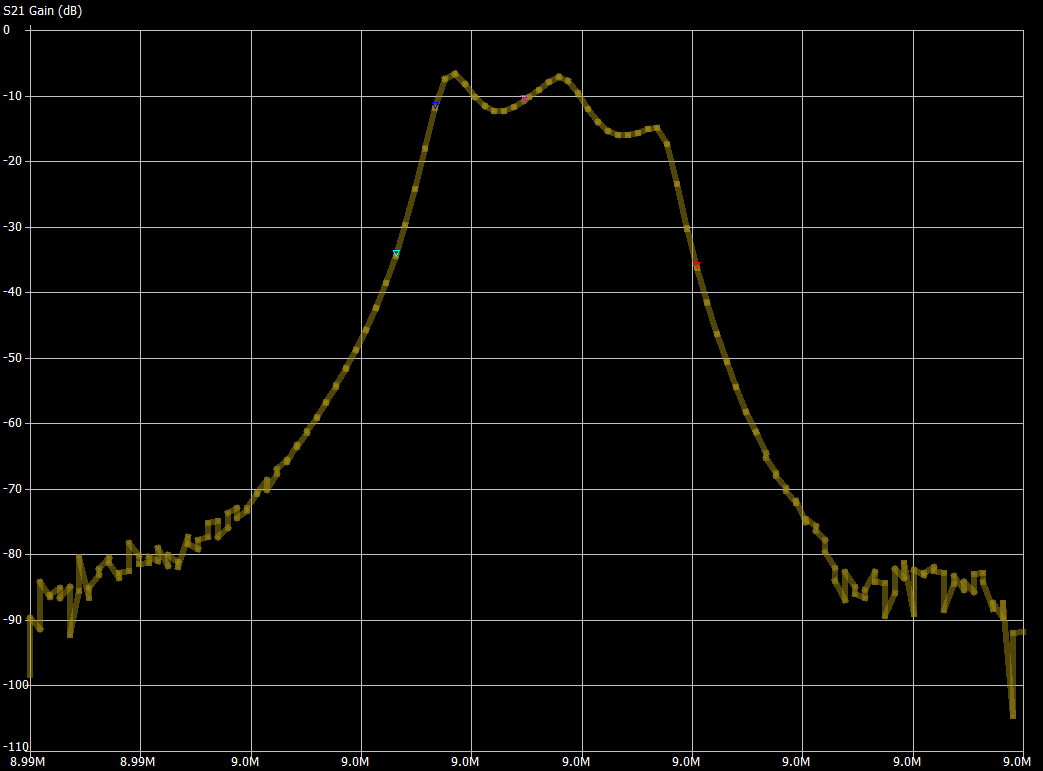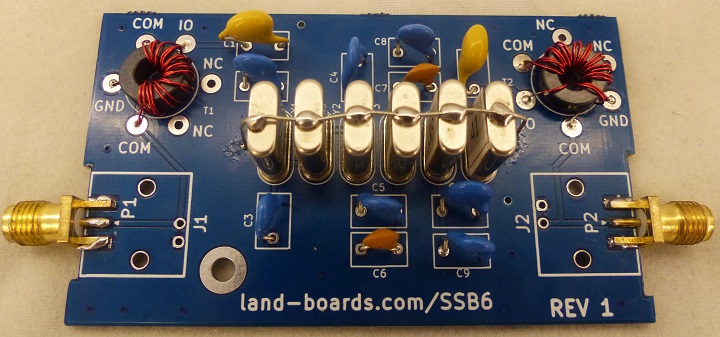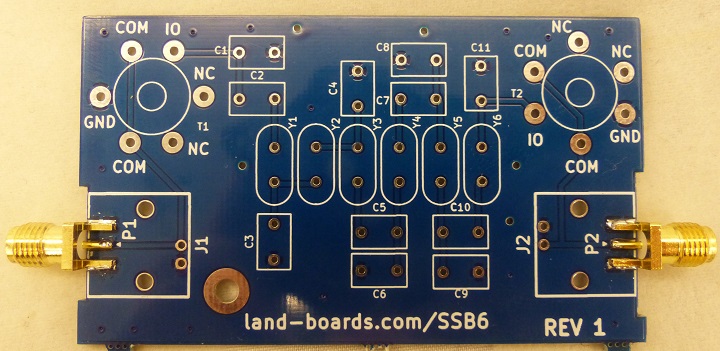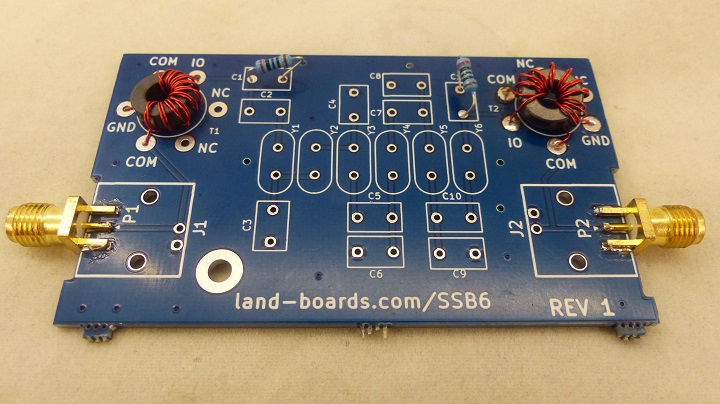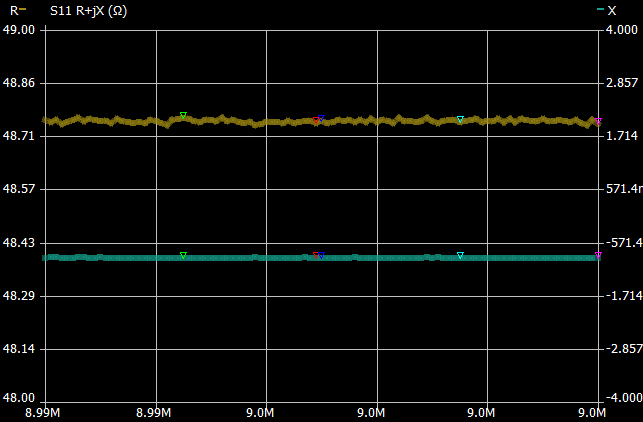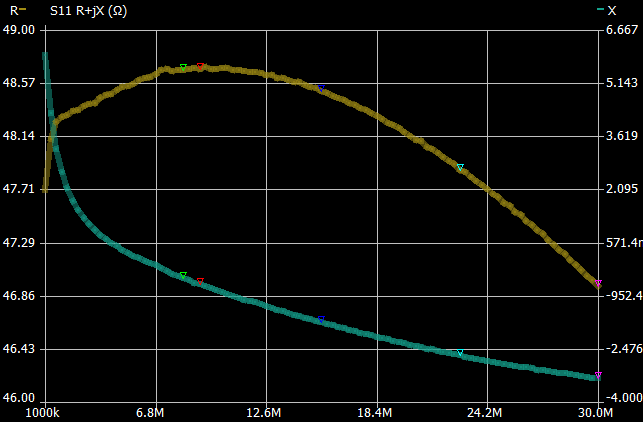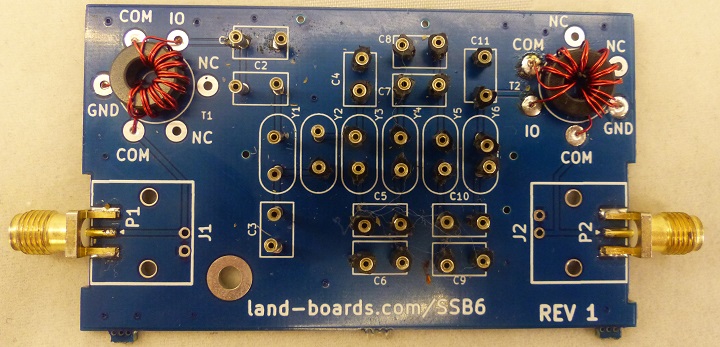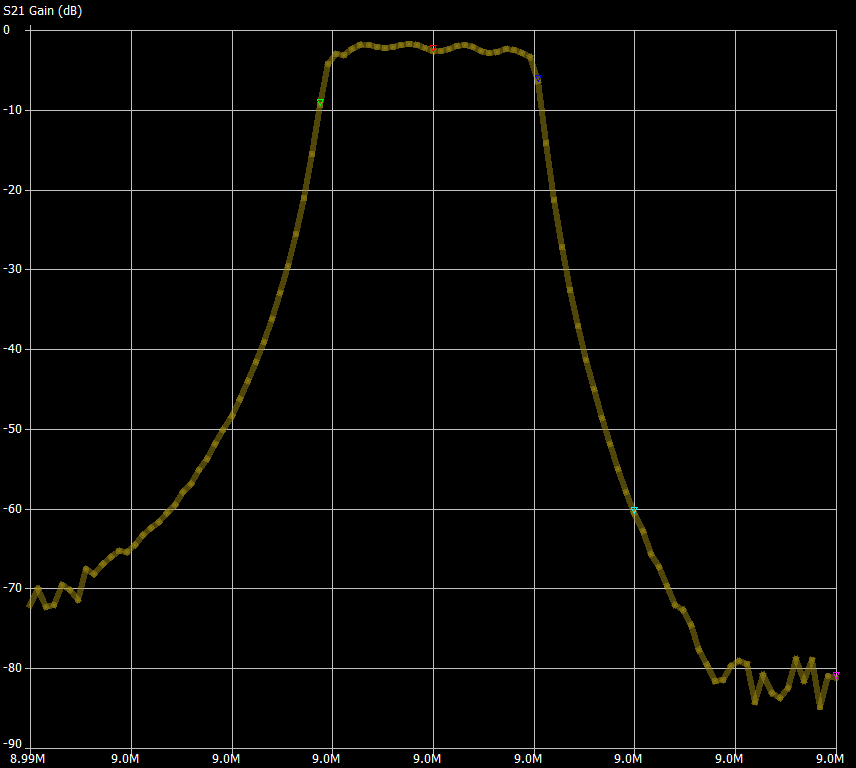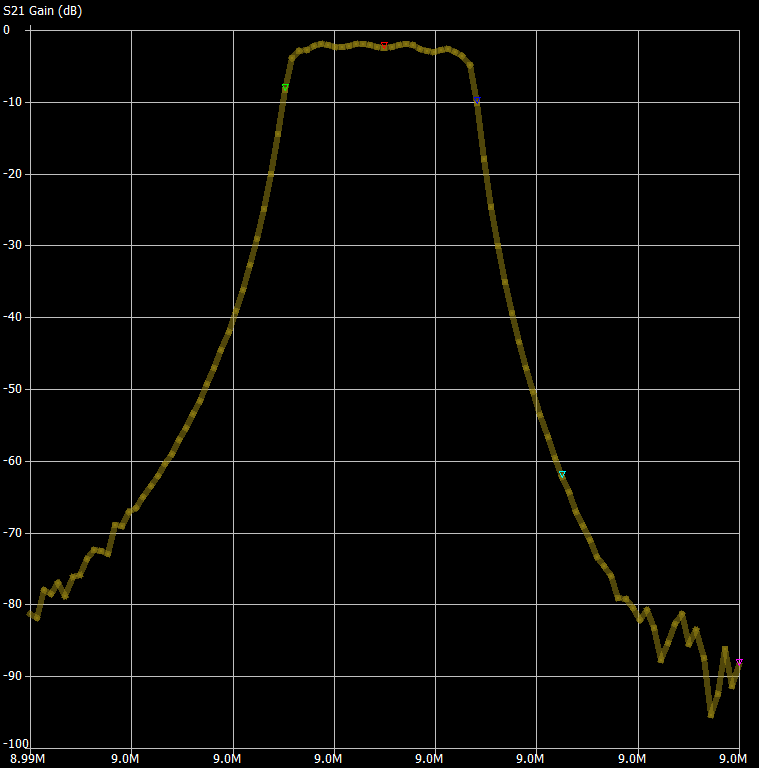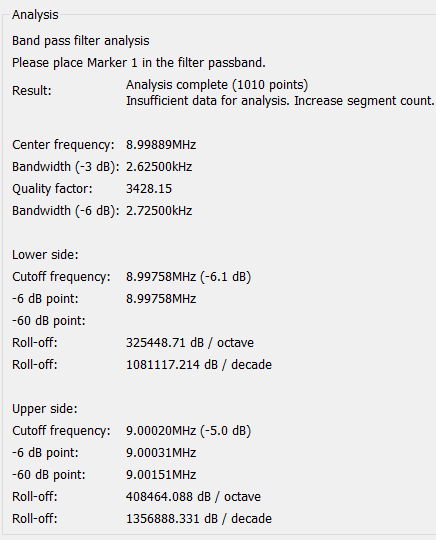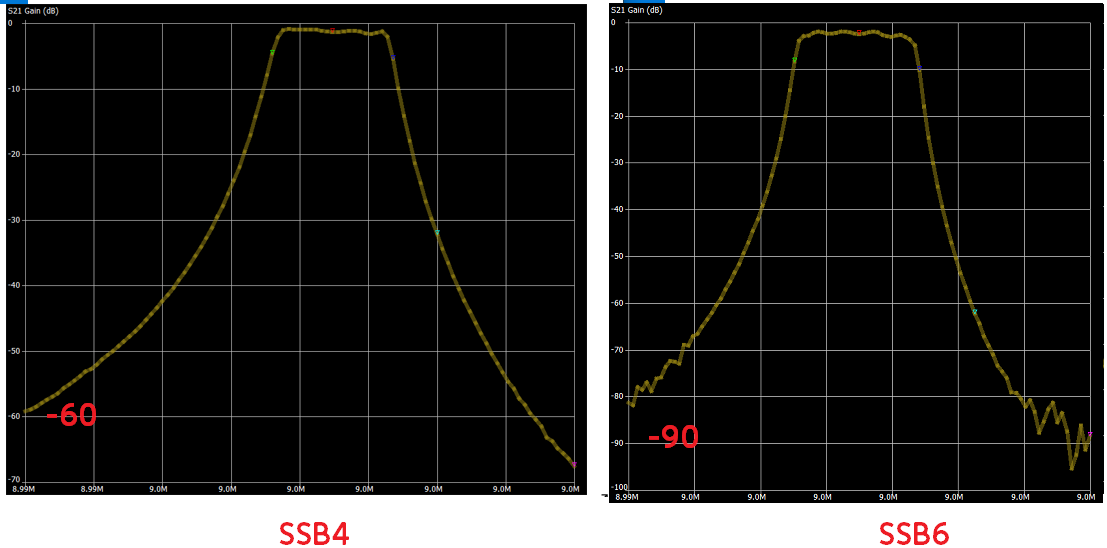Difference between revisions of "SSB6 Design"
Jump to navigation
Jump to search
Blwikiadmin (talk | contribs) (→Design) |
Blwikiadmin (talk | contribs) |
||
| (16 intermediate revisions by the same user not shown) | |||
| Line 1: | Line 1: | ||
| − | [[FILE: | + | [[FILE:SSB6_P1916-720px.jpg]] |
== Design == | == Design == | ||
| Line 81: | Line 81: | ||
* NanoVNA | * NanoVNA | ||
* 2.5 KHz / div | * 2.5 KHz / div | ||
| + | * Initial measurement shows issues (solved later on this page) | ||
[[file:SSB6_NanoVNA_9MHz_2.5KHzPerDiv.png]] | [[file:SSB6_NanoVNA_9MHz_2.5KHzPerDiv.png]] | ||
| Line 131: | Line 132: | ||
* Had to scrape away solder mask to solder | * Had to scrape away solder mask to solder | ||
** Through hole vias were plated through | ** Through hole vias were plated through | ||
| − | ** Would be better with ground pads with cleared solder mask and thermal relief | + | ** Would be better with ground pads with cleared solder mask and thermal relief (Version 2) |
* No change | * No change | ||
| Line 166: | Line 167: | ||
[[file:SSB6_NanoVNA_1-30MHz_Transformer_Input_Impedancee.png]] | [[file:SSB6_NanoVNA_1-30MHz_Transformer_Input_Impedancee.png]] | ||
| + | |||
| + | * Add machine socket pins to install parts | ||
| + | |||
| + | [[FILE:SSB6_P1892-720px.jpg]] | ||
| + | |||
| + | * Install caps in socket pins | ||
| + | |||
| + | <pre> | ||
| + | 08 8.997809 10.3 10.3 | ||
| + | 30 8.997810 11.3 11.3 | ||
| + | 48 8.997812 13.3 13.3 | ||
| + | 50 8.997814 15.3 15.3 | ||
| + | 31 8.997818 19.3 19.3 | ||
| + | 46 8.997822 23.3 23.3 | ||
| + | </pre> | ||
| + | |||
| + | * Parts installed on pinned card | ||
| + | |||
| + | [[file:PinJig-01.png]] | ||
| + | |||
| + | ==== Fixed First Card ==== | ||
| + | |||
| + | * Compared pinned board to first board | ||
| + | * Noted C5 and C6 were swapped | ||
| + | * Repaired | ||
| + | * Sweep | ||
| + | |||
| + | [[file:PinJig-02.png]] | ||
| + | |||
| + | * Excellent results | ||
| + | * 2.625KHz bandwidth - close to 2.5KHz design goal | ||
| + | * 2.5 dB insertion loss | ||
| + | * Low ripple. | ||
| + | * Fcenter = 8.998892 MHz | ||
| + | |||
| + | [[file:PinJig-03.png]] | ||
| + | |||
| + | ==== SSB4 vs SSB6 ==== | ||
| + | |||
| + | [[file:SSB4_vsS_SB6_NanoVNA_9MHz_1KHzPerDiv-fixed.png]] | ||
| + | |||
| + | * Input complex impedance across passband | ||
| + | |||
| + | [[ile:SSB6_Input Impedance_InPassband.png]] | ||
== References == | == References == | ||
Latest revision as of 10:59, 30 October 2021
Contents
Design
- 6 element filter
- W7ZOI Crystal Filter paper has several crystal filter designs
- Narrow bandwidth bandpass filters for CW/SSB
- This is the 6 crystal SSB6
- Used for transmit/receive
- 9 MHz nominal frequency
- 50 Ohms in/out impedance
- Bin crystals using Colpitts Crystal Oscillator
- Hand select close values from a pile of crystals
- Can get much closer than 10% of bandwidth with 50 crystals
- W7ZOI Filters on Kits and Parts Boards
- Other filter builds
- 5 or less crystals
W7ZOI SSB6 Schematic
- Response curve
Build
- SSB6 filter is too big for Kits and Parts board (5 crystals limit)
- 2500 Hz bandwidth
Schematic
Dishal Values
- Impedance = 195.9
RefDes Dishal RefDes W7ZOI Ck12 87.3 C3/C9 82 Ck23 110.9 C4/C8 100 Ck34 114.4 C6 100 Cs1 110 C2/C10 120 Cs3 369.5 C5/C7 470
Measured Crystal Values
- 6 crystals within 7 Hz of each other
- Selected from 50 purchased
Number Freq Delta from average 09 8.997791 -7.7 12 8.997791 -7.7 41 8.997793 -5.7 06 8.997794 -4.7 21 8.997798 -0.7 38 8.997798 -0.7
Enclosure 80x50x20
- Fits in 80x50 extruded enclosure
- Material: Aluminum
- Color: black
- Size: approx.80*50*20mm
- Thickness: approx.1mm
Performance Measurements
Overall
- NanoVNA
- 2.5 KHz / div
- Initial measurement shows issues (solved later on this page)
Detailed
- 1 KHz/div
- Bandpass looks about 2500 KHz = good
- Left freq = 8.99762 MHz
- Right freq = 9.00005 MHz
- Delta = 2.43 KHz
- Center frequency = 8.99885 MHz
- Implies crystals are properly matched?
- Insertion loss at "best" point (red marker) -5.14 dB = OK
- Deep skirts = good
- Ripple looks bad
- Right side low
Compared to SSB4
- Fcenter = 8.998MHz
- Span = 10KHz
- 1 KHz/div
- Skirts much deeper on SSB6 than SSB4
- -90 dB on SSB6 at window edges
- -60 dB on SSB4 at window edges
- Passband much flatter on SSB4
- Insertion loss lower on SSB4
- SSB4
Improvements
- Investigate changes to remove ripple and clean up right side of passband
Clean Board
- Cleaned board
- Removed wires on transformer that were not clipped flush-ish
- No effect - same ripple, same drop at the right side, same insertion loss
- No change
Add grounds to cases of crystals
- Had to scrape away solder mask to solder
- Through hole vias were plated through
- Would be better with ground pads with cleared solder mask and thermal relief (Version 2)
- No change
Incremental Build and Test
- Start with unpopulated board
- Add SMA connectors
- Added transformers
- Installed 200 ohm resistors at input caps to ground
- At C1, C11
- Measure transformer impedances from NanoVNA
- Input
- 48.9-j0.900 Ohms
- VSWR 1:1.031
- Output
- 48.7-j0.714 Ohms
- VSWR 1:1.031
- Input
- Impedance is flat over passband
- Transformer working as expected
- 1-30 MHz scan
- Toroid flat to board or tilted up = same performance
- Not flat over band, but OK at 9 MHz
- Add machine socket pins to install parts
- Install caps in socket pins
08 8.997809 10.3 10.3 30 8.997810 11.3 11.3 48 8.997812 13.3 13.3 50 8.997814 15.3 15.3 31 8.997818 19.3 19.3 46 8.997822 23.3 23.3
- Parts installed on pinned card
Fixed First Card
- Compared pinned board to first board
- Noted C5 and C6 were swapped
- Repaired
- Sweep
- Excellent results
- 2.625KHz bandwidth - close to 2.5KHz design goal
- 2.5 dB insertion loss
- Low ripple.
- Fcenter = 8.998892 MHz
SSB4 vs SSB6
- Input complex impedance across passband
ile:SSB6_Input Impedance_InPassband.png
References
- Crystal ladder filters – Software
- Crystal Ladder Filters for All - ARRL QEX
- DISHAL software by DJ6EV
- A Practical Test Set for Comprehensive Crystal Testing
- Crystal characterization and crystal filter design
- Crystal parameters Written by Hans Summers (QRP Labs)
